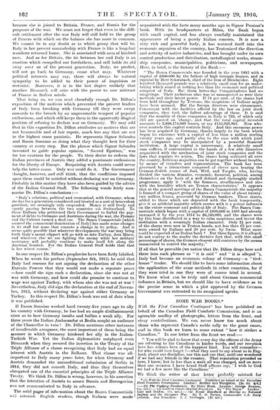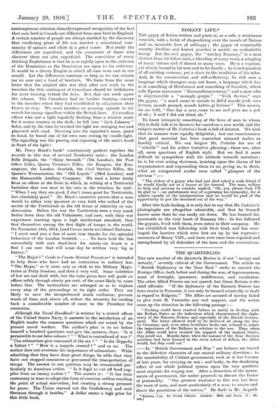SOME WAR BOOKS.*
With the First Canadian Conlingenti has been published on behalf of the Canadian Field Comforts Commission, and is an agreeable medley of photographs, letters from the front, and stray contributions. We can never know too much about those- who represent Canada's noble rally to ' the great cause, and in this book we learn to- some extent " how it - strikes a. Canadian." In one letter from the front .we read: " Yon will be glad to know that every day the.officers of the Army are ref erring to the Canadians in kinder words; and our reception here has always been of the happiest kind. You will remember— for who could ever forget ?—what they used to say about us in Eng- land, about our discipline, our this and our that; until one wondered if we had any friends in the country. That reputation preceded us here, I know, but in less than a week all was changed, and on more than one occasion I have heard Staff officers say, I wish to God.
we had a few more like the Canadians.' " - We think the writer of that letter probably mistook for
• (1) With at First Canadian contingent Published on behalf of Use Canadian Field-Comforts 'Commission. London: Hodder and Stougnou. Od. ____(2) The Fightit, Territorials. By Percy Hurd. London : George Hewn's,. net.]—(3) Gentle to Courts-Martial Pro.7.drire. By ".The Major. London - Gale and Folden. met.)-----(4) Naval Handbook as Hearing on National" Defense and the European War. By T. I). Parker. Commander U.S. Nary (retired). San Francisco : J. J. Newbegin. ($1 not.]
contemptuous criticism clumsily expressed recognition of the fact that men bred in Canada are different from men bred in England. A certain number of people are always startled by the discovery that conflicting plans of life can survive a sensational com- munity of opinion and effort in a great cause. But really the differences are superficial, and the comments of those who discover them are also superficial. The conviction of every thinking Englishman is that he is as rightly open to the criticism of the Dominions as the Dominions are open to his criticism.
It would be a dreary Empire in which all men were cast in one mould. Let the differences continue so-long as we can remain (as we now are) a band of brothers. We learn from the same letter that the original idea was that after one week in the trenches the first contingent of Canadians should be withdrawn for more training behind the lines. But that one week upset the scheme. The Canadians had no further training—except in the trenches where they had established to admiration their fitness to stay. We must mention an amusing episode in the search for enemy signallers within the British lines. A Canadian officer who saw a light regularly flashing from a window made for it across country in the dark ; he fell into " Jack Johnson" holes, and by the time he reached the light was wringing wet and plastered with mud. Bursting into the signaller's room, pistol in hand, he found one of his own men sewing by candle-light. The signalling was the passing and repassing of the man's hand in front of the light !
Mr. Percy Hurd's book = conveniently gathers together the records in this war of several Territorial units : the London Rifle Brigade, the " Shiny Seventh " (7th London), the Post Office Rifles, Queen Victoria's Rifles, the Rangers, the Ken- singtons, the London Scottish, the Civil Service Rifles, the Queen's Westminsters, the Old LayaLs " (23rd London), and
the Honourable Artillery Comparty. We read a letter lately from an officer at the front in which,' in writing of a Territorial
battalion that was next to his own in the trenches, he said : " When I say they are good, I don't mean good for Territorials, but absolutely good." Mr. Hurd's narrative proves that a man would be either very ignorant or very bold who talked of the merits of the Territorials in the old terms of relativity or con- descension. Before the war the Territorials were a very much better force than the old Volunteers, and now, with their war experience reacting upon a high intellectual standard, they find themselves among the first flight of troops in the world.
On November 14th, 1914, Lord Cavan wrote to Colonel Malcolm : " I must send you a line of most true thanks for the splendid behaviour of the London Scottish. . . . To have held the line successfully with men dead-beat for ninety-six hours is a feat I am sure that will some day be written very big in history."
"The Major's" Guide to Courts-Martial Procedure3 is intended to help those who have had no instruction in military law.
"The Major," as it Were, acts as clerk to the Military Magis- trates at Petty Sessions, and does it very well. Some subtleties of law are not dealt with, but the rules given here will guide an officer safely through ninety per cent. of the cases likely to some before him. The instructions are arranged so as to explain every step of the proceedings in its right order. They are likely to save the inexperienced much confusion, prevent waste of time, and, above all, reduce the necessity for sending back a considerable number of cases to the President for correction.
Although the Naval Handbook' is written by a retired officer of the United States Navy, it answers to the satisfaction of an English reader the common questions which are raised by the present naval warfare. The authors plan is to set before himself & hundred questions and give the answers, thus: "Is it permissible to use false colours ? " " What is contraband of war ?" " Can submarines give command of the sea ? " " Is the Zeppelin a failure ? " " How is a torpedo steered " and so on. The author does not overstate the importance of submarines. While admitting that they have done great things, he adds that they have not stopped commerce or prevented the transportation of troops. The answer to one question may he commended par- ticularly to American 'critics. " Is it legal to cut off food sup- plies from an enemy nation ? " The answer is : " It has been customary in wars to adopt this form of coercion, seldom reaching the point of actual starvation, but creating a strong pressure for peace. The Union starved out the Confederacy and sent Sherman through it besides." A dollar seems a high price for this little book.



















































 Previous page
Previous page